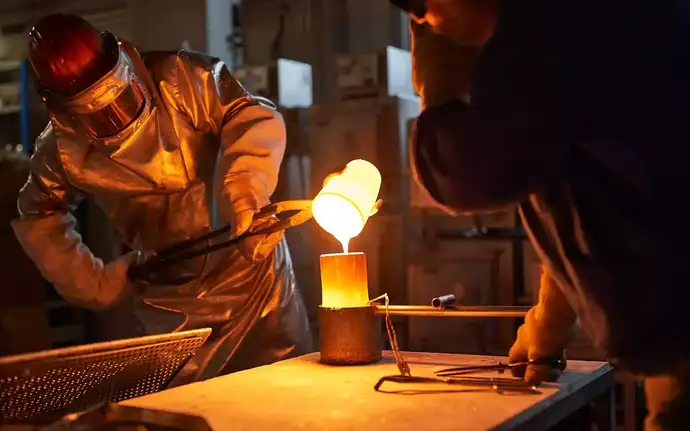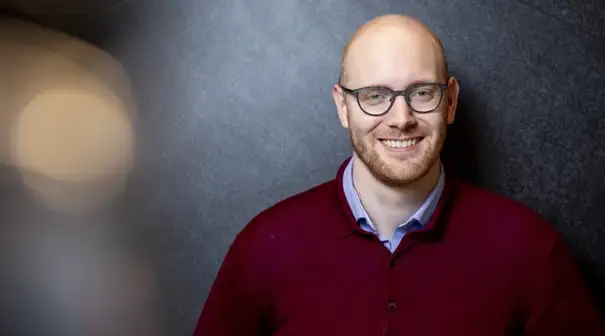Climate protection: SCHOTT drives transformation forward and takes stock
Thursday, 7 December 2023, Mainz, Germany
- First climate-friendly electric melting tank in planning
- Climate targets receive official scientific confirmation
- Further reduction targets set for value chain

SCHOTT has therefore already made reducing its emissions in its own production a focus of its sustainable company transformation since 2020. Absolute emissions have been reduced by 60% since 2019 by switching to green electricity and continuously increasing energy efficiency. Despite growth and high energy consumption, the Group kept CO2 emissions constant in fiscal year 2022/23.
“We have already achieved the first important milestones, such as switching to 100% green electricity, in the last two years. Now we must solve complex technical challenges with our melting tanks,” says Dr. Jens Schulte, member of the SCHOTT Board of Management and responsible for the “Zero Carbon” strategy program. “In order to reduce emissions even further and achieve our climate targets, we must break new technological ground. Our focus is on developing innovative technologies to melt glass more sustainably.”
Technological change: research projects with green electricity and hydrogen deliver initial important results
SCHOTT is currently conducting pioneering research into melting glass with sustainable energy sources instead of natural gas. Here, the Group is focusing on two options: electrifying the melting tanks with green electricity, or using green hydrogen. Laboratory tests with 100 percent hydrogen were successfully carried out in the spring of 2023. More tests on melting tanks on an industrial scale are to follow next year.SCHOTT recently launched several research projects aimed determining the proficiency of electricity in regards to the highly complex material and process requirements of melting specialty glass. “Our results were very promising,” says Michael Hahn, Head of Melting Research. “In the pilot plant, we were able to increase the share of electrical energy to up to 60% for difficult-to-melt aluminosilicate glasses, for example, while maintaining at least the same glass quality. We have thus shown that a ‘super-hybrid tank’ with a higher percentage of electrical heating than fossil heating is possible in principle.” Tests are now to be carried out directly on the newly-developed tanks, and under real production conditions, in order to learn more about the processes in the tank.
Pilot project: climate-friendly electric melting tank
Now, SCHOTT is taking the next step towards decarbonizing its production. The company plans to build an electric melting tank in Mitterteich, Bavaria, by the beginning of 2026. The tank will be the first of its kind, using electricity to melt glass for the pharmaceutical industry in a much more climate-friendly way. Following the company’s technology roadmap, the development will mark an important step in its ultimate plan to gradually implement sustainable technologies across the board in its plants. The pilot tank powered by green electricity is expected to reduce greenhouse gas emissions by around 80 percent compared to the melting tanks currently in use. Natural gas will still need to be used in some areas. The innovative project is intended to set new standards for the entire industry, and is therefore being funded by the German Federal Ministry for Economic Affairs and Climate Protection and the European Union to the tune of 14.8 million euros. SCHOTT will invest a total of around 40 million euros in this innovation.Energy efficiency: reduction by 22,000 MWh
Energy efficiency has increased continuously and systematically. A total of 22,000 MWh/year and 8,800 tons of CO2e/year were saved, which equates to the electricity consumption of more than 7,300 two-person households in Germany. The company is also developing solutions such as expanding the compressed air supply, recovering heat from melting tanks, and improving roller cooling. Additional local projects will provide further energy savings, such as using waste heat at the SCHOTT Pharma site in Müllheim, Germany, to heat private homes, the installation of solar panels at the plant in Lanškroun, Czech Republic, and the construction of a new building in Landshut, Bavaria, which is powered by 100% green electricity.100% green electricity: expansion of the portfolio
The Group was also able to expand its portfolio in the area of green electricity. Since 2021, SCHOTT has switched to 100% green electricity with the help of Energy Attribute Certificates (EACs) and Power Purchase Agreements (PPAs). The company relies on high-quality, independently audited green electricity labels. To date, the Group has concluded seven direct contracts with energy producers (PPAs) – with these, SCHOTT is supporting the energy transition in Germany. SCHOTT plans to cover around 24 percent of its electricity consumption in Germany through PPAs in 2024. The goal is to further expand and internationalize these contracts with suppliers of renewable energy systems. The first contract has already been signed in Asia. The SCHOTT plant in the Indian state of Gujarat has been receiving electricity from a wind-solar park since the spring of 2023.Scope 3: The Group also wants to reduce emissions in the value chain
Until now, the technology Group’s climate strategy has focused on the emissions from its own production (Scope 1+2). Now, for the first time, SCHOTT has determined the dimension of emissions along its value chain (Scope 3) and has thus set further reduction targets in this regard. In 2019, these Scope 3 emissions amounted to around 1.3 million tons of CO2e. By 2030, the absolute emissions in Scope 3.3 (energy and fuel-related activities) and Scope 3.15 (investments) are to be reduced by 27.5%. The Group is also working closely with its suppliers. 74.23% of the suppliers with the highest emissions are to also set themselves science-based climate targets by 2027.Science-based climate targets by joining an international climate initiative
It is important for SCHOTT to align its climate targets with the current state of climate science. For this reason, the Group has joined the global Science Based Targets initiative (SBTi), whose members are pioneers in the decarbonization of the economy. The initiative is regarded as the Gold Standard for scientific climate targets. Through its commitment, the technology Group wants to help limit global warming to 1.5 degrees Celsius and fulfill the requirements of the Paris Agreement. SCHOTT has set specific targets for all three Scopes, which have been reviewed and confirmed by the SBTi.German Sustainability Award for ambitious strategy
With such ambitious goals, the climate protection strategy still has many more steps to take, and numerous challenges to overcome. This is the case not only for SCHOTT, but for all other players who are committed to sustainable development. The fact that SCHOTT has already received initial public recognition for its measures is an encouraging sign for the journey ahead. After winning the dena “Energy Efficiency Award” in the fall of 2022, SCHOTT was honored twice with the prestigious German Sustainability Award in November 2023 – one for the glass and ceramics industry sector, and the other an award in special recognition of climate transformation.“This renewed success confirms our strategy and motivates us to take the next steps with commitment,” says Dr. Jens Schulte. “Thanks to the IPO of our pharmaceutical subsidiary, we are in a good financial position to make further investments. Nevertheless, like many other manufacturing companies in Germany, we are dependent on certain framework conditions. These include the availability of green energy at competitive prices and a corresponding nationwide infrastructure.”
Background information on the SCHOTT Climate Strategy: Focus on four fields of action
As part of its “Zero Carbon Program,” SCHOTT has established four fields of action to reduce CO2 emissions. In addition to technological change and the use of 100 percent green electricity, this includes the continuous improvement of energy efficiency.As a final step, the Group also uses offsetting to compensate for remaining emissions. Despite all efforts taken, a manufacturing company like SCHOTT will not be able to avoid all emissions. For this reason, the Group will offset any remaining emissions harmful to the climate for the foreseeable future by participating in climate protection projects. In doing so, SCHOTT relies on certificates with strict international standards, such as the Verified Carbon Standard or the Gold Standard.
To calculate climate-relevant emissions, the emissions of all greenhouse gases are considered across the Group. In order to ensure comparability of the impact on the climate, SCHOTT expresses its greenhouse gas emissions in CO2 equivalents (CO2 e).
Further information on environmental protection at SCHOTT
With the help of test melts on a laboratory scale, SCHOTT obtains valuable data to optimize the processes involved in converting from natural gas to green electricity. Photo: SCHOTT/ Oliver Rüther
Experiments with hydrogen will reach 100% in laboratory tests in 2023. Further tests are to follow – but infrastructure and lack of availability in regard to the energy source remain a major challenge. Photo: SCHOTT
The new heating methods influence the manufacturing processes. Digital models help the experts to simulate the changes in the melting tanks.
Photo: SCHOTT/ Oliver Ruether
SCHOTT is working on numerous projects to increase energy efficiency. One example is this heat pump at the Mainz location. Photo: SCHOTT
Innovation in Bavaria. SCHOTT is planning a new melting furnace in Mitterteich that will produce pharmaceutical glass with low CO2 emissions using electricity by 2026. Up to 80% less emissions are possible. Photo: SCHOTT
Thanks to the team: Dr. Frank Heinricht, CEO of SCHOTT, accepted the German Sustainability Award 2023 and the special prize for the transformation field of climate. Photo: Ralf Ruehmeier
Pioneering. Responsibly. Together.
These attributes characterize SCHOTT as a manufacturer of high-tech materials based on specialty glass. Founder Otto Schott is considered its inventor and became the pioneer of an entire industry. Always opening up new markets and applications with a pioneering spirit and passion – this is what has driven the #glasslovers at SCHOTT for almost 140 years. Represented in over 30 countries, the company is a highly skilled partner for high-tech industries: Healthcare, Home Appliances & Living, Consumer Electronics, Semiconductors & Datacom, Optics, Industry & Energy, Automotive, Astronomy & Aerospace. In the fiscal year 2022, its 17,200 employees generated sales of 2.8 billion euros. SCHOTT AG is owned by the Carl Zeiss Foundation, one of the oldest foundations in Germany. It uses the Group's dividends to promote science. As a foundation company, SCHOTT has anchored responsibility for employees, society and the environment deeply in its DNA. The goal is to become a climate-neutral company by 2030.
Jonas Spitra
Head of Sustainability Communications





